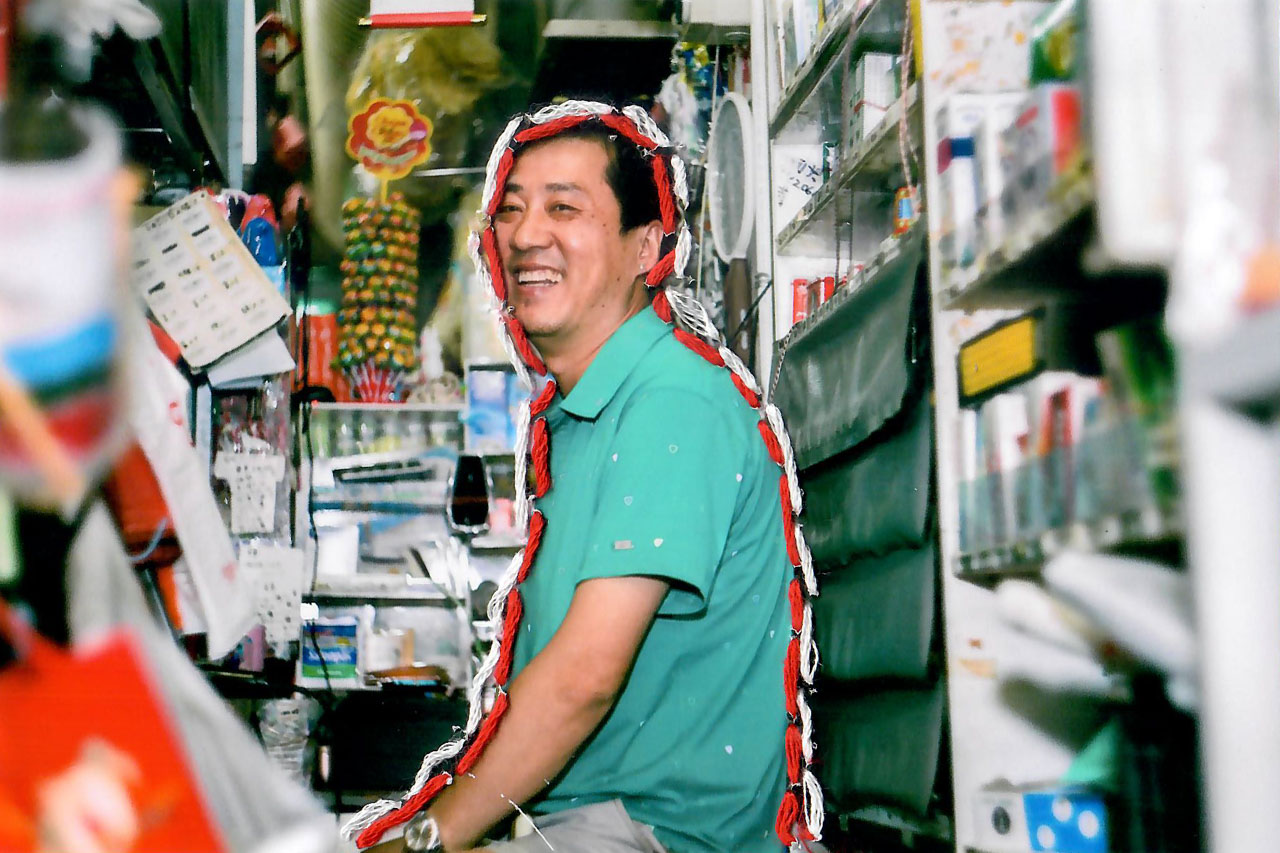Singaporean Enough delves into the captivating tales of immigrants weaving their identities and lives into the vibrant fabric of Singapore. We shed light on their journey of assimilation, bridging cultures and finding a shared sense of belonging in a new country they call home.
All images by Stephanie Lee for RICE Media
C & H Minimart sits at the foot of Block 605 on Woodlands Drive 42. It’s been there for 26 years, and it shows.
Bright yellow gachapon machines flank the entrance to the shop. Step through an entrance sporting yellowed, faded posters, and it’s as if you’ve been transported back in time.
ADVERTISEMENT
Narrow aisles are packed full of everything you could think of—organised chaos. The concrete floors are marked with worn-out paths. The store configuration clearly hasn’t changed in years.
Some items, like the cheap wireless earphones hanging near the cash register, are obviously of this decade. Others, like the neon-cloured plastic sand play sets, could have been plucked straight from my childhood in the 2000s.
At the helm of this institution is perhaps an unexpected character: China-born Zhao Hui, who only became a Singaporean citizen in 2018.
It’s a Friday when I arrive at the minimart to speak to him—his only rest day every week. He ushers me into the empty store, opened up specially for me, and settles naturally at his post behind the counter.
He looks the part of a local mama shop boss. But his younger self back in China would never have foreseen how he would eventually become a prominent fixture in Woodlands.
A Different Time
The 45-year-old was born in rural Gansu, but grew up in the city of Tianjin.
The ‘60s and ‘70s marked China’s Cultural Revolution. Thanks to Mao Zedong’s Up to the Mountains and Down to the Countryside Movement, an initiative to combat pro-bourgeois sensibilities, Zhao Hui’s city-dwelling parents were sent to the rural grasslands at the tender age of 18.
It was there that they met, married, and had Zhao Hui and his elder brother.
He tells me in his native Mandarin, however, that he only remembers his childhood in Tianjin.
“I was always extroverted and on the lively side. In fact, some might say I was too lively,” he says, revealing that he was scolded and beaten often.
He gets a mischievous glint in his eye as he recounts, “I was always moving and never stopped. I did a lot of dangerous things in my childhood. I wouldn’t walk properly on the pavement. Instead, I’d balance on the walls of people’s houses.”
His mother once brought him to a mental hospital because she suspected he had attention deficit/hyperactivity disorder (ADHD). But she didn’t get an official diagnosis. Instead, the doctor just confirmed that Zhao Hui was simply “very playful”.
This free-spiritedness persisted into his teenage years, and he admits that he never really did well at school. Concluding his education at 18 at a technical school he likens to Singapore’s Institute of Technical Education, he embarked on a string of odd jobs.
ADVERTISEMENT
“I’ve worked more jobs than most people,” he proudly declares. He went from waiting tables to working in a factory to helping his family run a chicken farm.
In his early 20s, however, he began to want more.
Leaving China
It began as wanderlust, Zhao Hui says.
“I felt that at that age, I should go out and see the world.”
A less rosy consideration was the untenable situation in his home country. At the turn of the century, the economy was “less than ideal”.
As much as China is a powerhouse today, competition was fierce enough in 2000 for Zhao Hui to consider pursuing greener pastures overseas.
It was a wise choice. Now, the competition has only escalated.
He tells me about a trip to his hometown last month. Across one 100-metre stretch of road were 10 bubble tea shops. On that same stretch, there were five Mixue Bingcheng dessert outlets owned by different franchisees.
“I walked a little further down, and there was another one in an alleyway! You can just imagine how intense the competition is,” he says, incredulous.
“Everyone is fighting to earn money. You can be an upright business person, but you won’t be able to survive.”
In a market where other businesses cut corners, the honest merchants are forced out, he says. It’s never been his type of scene, even back then.
He did some research and settled on three potential destinations: the US, Japan, or Singapore. In the end, it was a pretty simple choice for a practical reason.
“Maybe to a lot of people, it’s not a big consideration. But I’m naturally afraid of the cold. At least Singapore’s temperature is one that I like a bit more.”
When he first hatched the idea to go overseas, it was meant to be just for a few years. He’d planned to work here, then return to China, find a wife, and buy a house.
ADVERTISEMENT
He’d originally prepped for his Singapore jaunt by keeping his expectations low, and thought of it as “going to jail for a few years”.
Fortunately, Zhao Hui settled into his quality assurance job at an engineering company without much hiccups.
“When I got here, it was much better than jail! So don’t set your expectations too high,” he quips.
Like most new arrivals, he was impressed with Singapore’s cleanliness and infrastructure. But that wasn’t what made Singapore home.
Putting Down Roots
By 2005, he’d married his China-born wife and obtained his Permanent Resident status. In 2018, he sealed the deal and became a Singapore citizen, giving up his China citizenship.
The pair now live in a Woodlands executive HDB flat with their two children.
He’s sombre when he talks about their decision to settle here permanently. He had mixed feelings back then.
Both Singapore and China don’t allow their citizens to hold more than one citizenship, so it was a choice of one or the other.
“You must know, to give up your native country’s citizenship, it’s a huge life decision. It affects your entire life, your future, and your children.”
“It’s after a lot of consideration that someone would make this decision.”
Humans naturally seek out what benefits them the most, he says, so Singapore citizenship was his final choice.
I ask him what it is that he likes about Singapore. Zhao Hui has his answer ready; he’s obviously given it much thought.
“People like to give surface-level answers like how clean the environment and air is. Now I tell my friends that the best part is Singapore’s humanity.”
He cites several cases of the bystander effect, where people in distress have been left unaided on crowded streets. One reason is because bystanders fear they’ll get sued by the victim, he says.
“In Singapore, you wouldn’t be afraid of that. Why? It’s something to think about.”
Over the years, Zhao Hui’s values and morals have become more aligned with Singapore’s. It’s come to the point where he feels the cultural gap whenever he visits friends and family in his hometown.
“When I first got here, I had preconceived notions about race and class,” he recounts.
In China, where social stratification is culturally prevalent, people from cities will often look down on those from rural areas, he explains. It was in Singapore that his mindset eventually shifted.
“Over time, I realised that the Singapore government has done a great job in this area of educating people. I’ve learned that you cannot judge or label people based on their race or where they’re from.”
It’s also a lot easier to do business here, he says. In China, it’s all about having a solid network of commercial contacts. In Singapore, he feels he has more opportunities to succeed as an average Joe.
“For someone without an illustrious background, the chances for me here are much higher than in other countries. Because here, it’s about fairness and your ability.”
And it was here that he was able to make his dreams of owning a business a reality.
From Newspaper Vendor to Minimart Boss
As a child, Zhao Hui had dreamed about being a soldier. He’d felt like it would be a great honour to serve and protect his country. But as he grew up, he began to feel more suited to going into business.
For all his flitting from job to job in his younger days, he’s always had the presence of mind to save a decent chunk of his salary, he says.
He offers a pearl of wisdom: “I personally believe that opportunities are given to those who are prepared. When you want better prospects, you have to plan for it, be it your physical health, or knowledge, or your capital.”
So when a friend approached him to help invest in and run a newspaper vending business in 2013, he didn’t hesitate.
Sure, his quality assurance job at the engineering company was stable. But the career prospects weren’t the best.
“My education level isn’t very high, so my possibility of climbing to a manager position was practically zero. The highest I’d able to reach would be a supervisor.”
He had his sights set higher. “If you mix with the same people working in the factory every day, the things you’re able to see are limited to their frame of reference. When you step into the business world, the knowledge you’ll pick up is completely different.”
For about three years, he hunkered down. He earned more at his newspaper vendor job, but it was considerably more work. Not only did he have to work 365 days a year, but he also had to be at Causeway Point each morning at 3 AM to pick up the day’s papers. Then, he’d drive around Woodlands, Sungei Kadut, and Kranji to make his deliveries to different companies and shops.
Naturally, his paper route allowed him to get to know a whole roster of business owners. As fate would have it, he also delivered the papers to the minimart he’d eventually come to own.
“I realised that this shop had customers browsing no matter what time I came,” said Zhao Hui.
“For some shops, every time I go, I’d never see any customers. I’d just see the lady boss sitting there, playing on her phone.”
When he heard in 2017 that the woman running the minimart was looking for a successor so she could care for her ill husband, he saw his chance. Finally, he could be his own boss.
He’d never run a minimart before but didn’t see a need to mess with a winning formula. His secret to success was simply to keep things exactly as his predecessors had them, only making small tweaks when he began to get a better grasp of things.
A Minimart in Woodlands
For the most part, it’s worked. He’s maintained the business thus far and managed to preserve the unique rustic charm of the shop.
But there have been recent challenges. He points to the tobacco tax hike this February as one of the things vexing him, oddly enough.
At his minimart, cigarettes usually account for about 50 per cent of his takings. As a result of the 15 percent hike, his total revenue has dropped by about 20 to 30 percent, he says.
The last tax hike was 10 percent in 2018. Zhao Hui fears there’ll be more to come.
“Maybe I’m thinking too much, but I feel that the policy isn’t achieving its goal of getting people to reduce smoking. What I see is that practically no one has quit because of the higher tax. The people who think cigarettes are expensive will only be pushed towards buying illegal cigarettes or vapes.”
“Like I said, it’s human nature to do what benefits you the most. It’s risk and reward.”
Vapes are banned in Singapore, but still widespread and remarkably easy to obtain. As much as Zhao Hui wishes it was, though, stocking vapes at the minimart isn’t legal.
And despite the many illegal cigarette busts, the contraband continues to eat away at his takings, he says.
“Not all those who sell illegal cigarettes are caught, and those who buy illegal cigarettes still have channels to buy them. So there’s no change to my earnings.”
All he can do is watch as his customers who once bought cigarettes from him get their fix from other clandestine sources.
Sure, he could sell vapes under the table. It’d be easy pickings, considering that vaping has been rampant among local youths. But that would go against his moral compass. For better or for worse, that’s what he moved countries for—to earn an honest living as an upright business owner.
“Businesses in China don’t have a ‘bottomline’. But in Singapore, when you do business, you need to have a ‘bottomline’. Don’t do unethical things,” he says.
“I never want to earn money at the expense of other people.”
Home, Truly
To maximise his earnings, he’s instead spent countless hours fine-tuning his retail displays. There’s a reason why stepping into his little minimart feels like stepping into a time capsule.
The myriad of products stuffed into the small shop lot look haphazard at first glance, but as Zhao Hui shows me around, I slowly begin to see the thought behind every product’s placement.
Candies that kids gravitate towards are handily arranged at the perfect level for them to grab. Mineral water is relegated to the innermost corner of the drink section because it’s a staple and will sell even if it’s not in an eye-catching location, he explains.
It’s hard work—he’s at the minimart six days a week—but it’s clear that he relishes it.
Even with the hits he’s taken to his bottom line over the years, the beloved neighbourhood minimart is still trucking on with Zhao Hui at the helm.
He points to his regular customers as one of the bright spots of his job.
Often, he gets customers buying drinks and bread for foreign workers working outside, he says.
“It’s not just once; it’s many times. And it’s not the same person, but different people doing such good deeds.”
“This is what I like about Singapore.”






